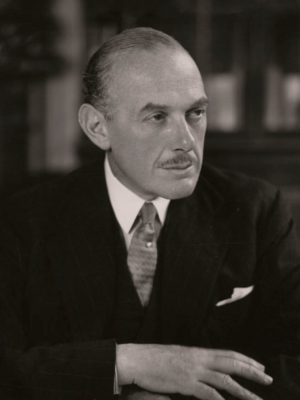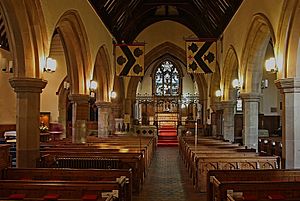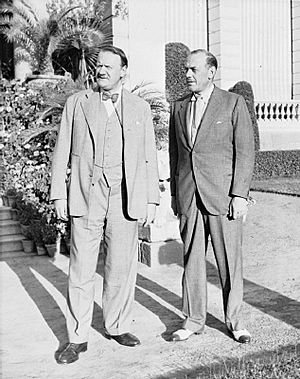Oliver Lyttelton, 1st Viscount Chandos facts for kids
Quick facts for kids
The Viscount Chandos
|
|
|---|---|
 |
|
| President of the Board of Trade | |
| In office 3 October 1940 – 29 June 1941 |
|
| Monarch | George VI |
| Prime Minister | Winston Churchill |
| Preceded by | Andrew Rae Duncan |
| Succeeded by | Andrew Rae Duncan |
| In office 25 May 1945 – 26 July 1945 |
|
| Monarch | George VI |
| Prime Minister | Winston Churchill |
| Preceded by | Hugh Dalton |
| Succeeded by | Hon. Sir Stafford Cripps |
| Secretary of State for the Colonies | |
| In office 28 October 1951 – 28 July 1954 |
|
| Monarch | George VI Elizabeth II |
| Prime Minister | Winston Churchill |
| Preceded by | James Griffiths |
| Succeeded by | Alan Lennox-Boyd |
| Personal details | |
| Born | 15 March 1893 Mayfair, London, UK |
| Died | 21 January 1972 (aged 78) Marylebone, London, UK |
| Political party | Conservative |
| Spouse | Lady Moira Osborne (1892–1976) |
| Children | 4 |
| Parents | Alfred Lyttelton Edith Balfour |
| Alma mater | Trinity College, Cambridge |
Oliver Lyttelton, 1st Viscount Chandos (born March 15, 1893 – died January 21, 1972) was a British businessman. He came from the important Lyttelton family. During the Second World War, he joined the government and held several important jobs as a minister.
Contents
Early Life and Military Service
Oliver Lyttelton was born in Mayfair, London. His father was Alfred Lyttelton, and his mother was Edith Balfour. He went to Eton College and Trinity College, Cambridge for his education.
During the First World War, he served as a soldier in the Grenadier Guards. This is where he met Winston Churchill, who would later become a famous Prime Minister. Oliver Lyttelton was recognized for his bravery and received two special awards: the Distinguished Service Order and the Military Cross.
Business Career
After the war, Oliver Lyttelton became a very successful businessman. In 1920, he joined the British Metal Corporation. This company was created to help Britain control the metal trade. It aimed to make the British Empire more independent in getting important metals like copper and tin.
He quickly became a leader at the company. He also joined the boards of many other companies around the world. This made him one of a small group of people who had a lot of control over the global metal trade.
When the Second World War started in 1939, he used his knowledge of the mining industry. He helped Britain get vital metal supplies at good prices. His work saved Britain a lot of money during the war.
After the Conservative Party left power in 1945, Lyttelton became the chairman of Associated Electrical Industries. This was a large company that made electrical products.
Political Career
In 1940, Oliver Lyttelton became a Member of Parliament (MP) for Aldershot. He was part of the Conservative group. In the same year, he joined Winston Churchill's government during the war. He became the President of the Board of Trade, which meant he was in charge of trade.
From 1941 to 1942, he was the Minister-Resident for the Middle East. Then, from 1942 to 1945, he served as the Minister of Production. This job involved making sure Britain produced enough goods for the war effort.
After the war, he was again President of the Board of Trade for a short time in 1945. When the Conservatives won the election in 1951, he was considered for a very important job, Chancellor of the Exchequer (in charge of the country's money). However, he was seen as too closely linked to business. So, he became Secretary of State for the Colonies instead. He held this position until 1954.
In 1954, he was given a special title and became Viscount Chandos. This meant he joined the House of Lords, which is part of the UK Parliament.
Oliver Lyttelton was very against communism. In 1953, he stated that the British government would not allow communist states to be set up in the British Commonwealth.
Later Career and the National Theatre
After leaving Parliament, Viscount Chandos went back to Associated Electrical Industries. He helped the company grow into a major British business.
National Theatre
In 1962, Viscount Chandos became the first chairman of the National Theatre. This is a very famous theatre in London. He served in this role until 1971. His parents had also worked hard to help create the National Theatre. Because of his contributions, one of the theatres in the National's building is named the Lyttelton Theatre.
During his time as chairman, there was a disagreement about a play called Soldiers. The play talked about Winston Churchill in a way that some people found controversial. Even though the director, Laurence Olivier, didn't fully agree with the play's view of Churchill, he supported putting it on. However, the National Theatre's board decided not to produce the play. Lord Chandos called the play a "grotesque and grievous libel" (meaning it was a very unfair and harmful lie).
Order of the Garter

In 1970, he received a very high honor. He was made a Knight of the Garter. This is one of the oldest and most important awards in Britain. His special banner, which hung in St George's Chapel at Windsor Castle, is now displayed in the Church of St John the Baptist in Hagley.
Family Life
Lord Chandos married Lady Moira Godolphin Osborne in 1920. She was the daughter of the George Osborne, 10th Duke of Leeds. They had four children: three sons and one daughter.
Their children were:
- Antony Alfred Lyttelton, who became the 2nd Viscount Chandos (born 1920, died 1980)
- Rosemary Lyttelton (born 1922, died 2003), who married Anthony Chaplin
- Julian Lyttelton (born 1923), who was a soldier and sadly died in Italy in 1944 during World War II
- Nicholas Adrian Oliver Lyttelton (born 1937)
Lord Chandos passed away in Marylebone, London, in January 1972, when he was 78 years old. His oldest son, Antony, took over his title. Lady Chandos died in May 1976.
 | Delilah Pierce |
 | Gordon Parks |
 | Augusta Savage |
 | Charles Ethan Porter |


